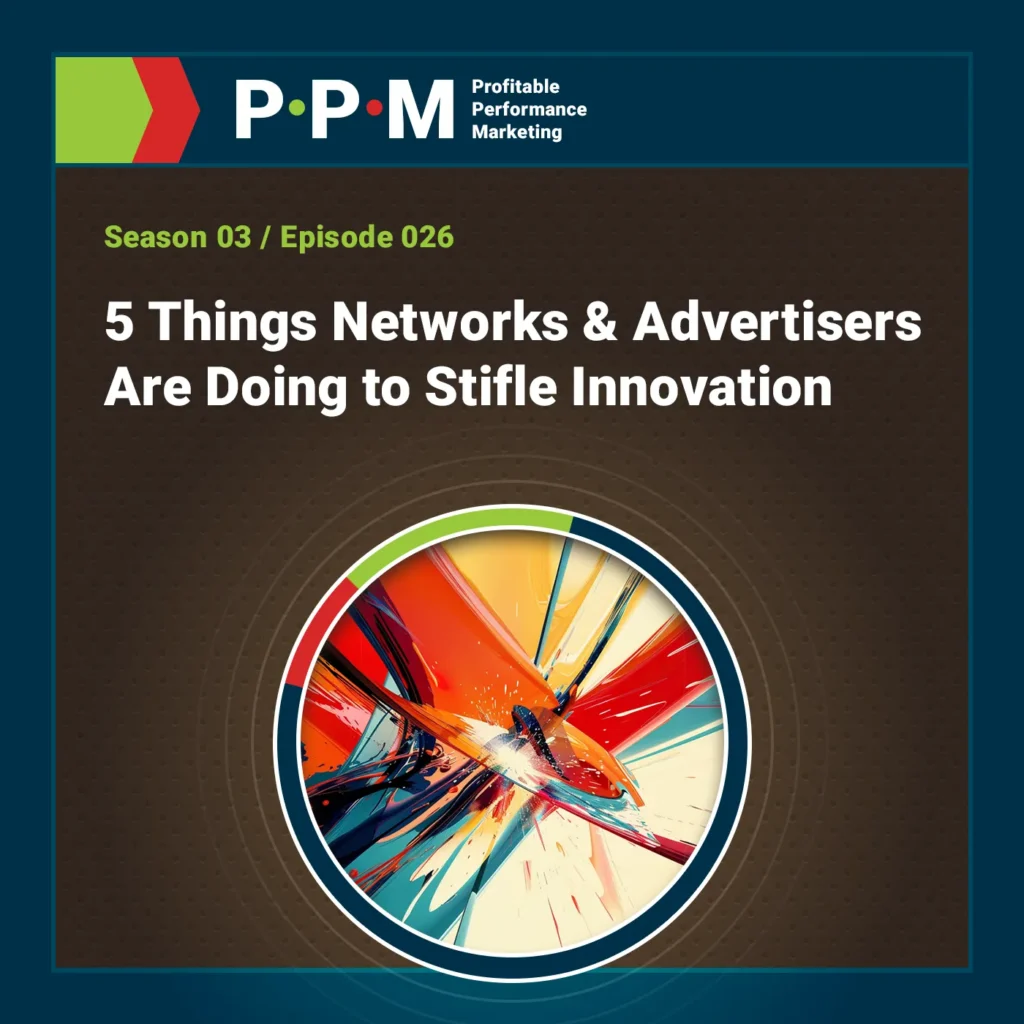Season 02 / Episode 019
Affiliate Program Tracking Testing
Note: if you get only a 30 second preview, please log into your Spotify account, or find us on one of several other podcast services.
Summary
Are you testing your affiliate program tracking? Today our CEO, Jamie Birch, talks about the importance of testing your affiliate program to ensure all areas are tracking correctly, his exact tracking protocol and procedure, and how to make sure your channel has 100% integrity in tracking all affiliate orders.
Listen
Share
Notify
Want to be notified when we release a new episode?
Transcript
[00:00:50] Jamie Birch: Well, good morning Profitable Performance Marketing podcast listeners. I am Jamie Birch, your host of the podcast and CEO and founder of your award-winning affiliate management agency, JEBCommerce. Yeah, I’m coming to you in the morning bright and early this morning to talk to you about the importance of tracking testing in your affiliate program. You may be saying, “Jamie, I get it. Once it’s working, it’s working. Leave it alone.” I wouldn’t say that. Let’s talk about a few things and why this is really, really important. We have several processes on tracking, but I’ll read through some of the things that we talked about. One thing, before you get into tracking testing, you want to make sure you have time. You don’t want to rush through something like this. You want to make sure you have the ability to find all the information required.
When you’re testing tracking, you want to have order numbers that you test. You even want to keep the source code or the confirmation page of the site that you are testing. But the importance of testing you’re tracking, it should be fairly obvious. We need to make sure, you need to make sure that your affiliate program that your channel is tracking 100% or as close to that 100% as possible. That’s every affiliate and every possible iteration.
Over the last 25 years I’ve been doing affiliate marketing and managing programs in house, managing programs with different agencies and managing programs at JEBCommerce, my agency, I have run into multiple occasions where the specific guidelines to install affiliate tracking weren’t followed by the development team. I’m not calling them out. They did the best they could, they integrated it within their platform, the best that they thought that would happen. But many, many times one thing that happens is they make it conditional. Most of the affiliate networks and platforms when you install their tracking, it isn’t conditional. Here’s what I mean by conditional.
Conditional is, if this is affiliate tracking, or this is an affiliate customer, then place the tracking on the page and on the website. This comes into play when you’re doing pixel tracking and last click tracking. What happens with that conditionality is it’s always missing some percentage of sales that come through the affiliate program and that doesn’t deem that they did, so you miss quite a few orders. That’s inevitable. You always want to test to make sure that that tracking has integrity.
How do we do these tests? We do multiple orders. We clear our cache, open a new browser, and place test orders. Sometimes our clients have specific test orders, credit cards that they want us to use. I use that and then I use ones that no one knows about that look like regular orders. I want to know if that tracking is going to fire when no one is looking, and we’re out of process and we’re just a consumer. You want to save the source code on each page and save your order numbers.
Now, when I place multiple orders, I go through multiple browsers, I go through multiple affiliates. I do a mobile and a desktop order. What you’re trying to do is paint this picture of like many differences. In those places, I’m using two or three different browsers, those are three orders. I’m using three or four different affiliates. I’m also using different types of affiliates when I do that. I’m not doing all coupon sites, or all search sites or all content sites. I’m mixing it up. I’m picking a top performer, a bottom performer, someone who’s never performed before. I’m trying to get a random selection as much as possible to paint the broadest picture of what is working and what’s not working. Then once you get all those done, I usually wait a day. Now, a lot of affiliate programs, they report things 30 minutes after they happen. Sometimes in real time. Know that when someone says they track in real time in real time, that can mean a lot of different things to a lot of different people.
I usually give it a day to see what happens. I store all my order numbers in an Excel spreadsheet, so I have them. I keep all my confirmation emails and all of those things, so that I know I have access to all those. Then the next day, I go back and I check. If some of those orders aren’t coming through, I get in touch with my network contact, and I ask them about the orders and see if they can find them. Maybe they were denied for some reason, we can go find out. If that doesn’t happen, then we go back to the business intelligence team for the brand that we’re working at and we give them the orders. We ask them, “What do you see with these orders? We placed a broad test yesterday. This is what happened. We have some orders that aren’t tracking. Can you tell me if these orders are tracking?”
Once you do that, now, you can find out what’s happening. If you have an order that didn’t track, now, you’ve got to dig in. You’ve got to look at what browser you used, what affiliate you used, what product you purchased, what page on the site you entered. All those things you need to keep track of so you can then take back to the developers, your development team, your business intelligence team, whatever that is and say, “Hey! This order didn’t track. Talk to me. Can you help me figure out why it didn’t?”
Let’s talk about why this is important. It’s all about integrity. It’s about tracking integrity. You launched a program. You’re managing a program to get certain results. You are doing certain things that you think will get those results. If you aren’t confident in the tracking of those activities, how do you know what’s going on? How do you know that these things are working or not working? It’s about tracking integrity. It’s also about budget integrity. You are spending money to do a thing. In the case of agencies, you’re spending your clients’ money to do these activities, you have to report back how they’re working. Now, these can have significant impacts. If you are 10% off on your tracking for an initiative that you did, that may be the difference in that initiative being successful and it not being successful. It can be the difference between you getting a budget for that next time, and having your budget reduced because it’s not working.
One of the things we always battle with affiliate marketing is that they’re bottom feeders and they don’t add value. Having that tracking integrity is of utmost importance, so we’re capturing all of the things that are happening and making those budgetary decisions. Just think of, when you’re making marketing budget decisions, what about making budget decisions at home. If you’re not using the proper information to make those budget decisions, you are not able to make the correct ones. It’s about your offers. and your coupons and your initiatives integrity.
[BREAK]
[00:07:58] JB: Are you enjoying the show so far? Running an affiliate program can be very complicated. Running a highly successful affiliate program that grows year after year, well, that can be even more difficult. At JEBCommerce, we’ve been managing affiliate programs for over 17 years in almost every retail category you can imagine. With that experience comes a ton of successes and we want to share that with you so you can learn what to do to grow your affiliate program. We have a section on our website entitled Case Studies. You can access this page by going to jebcommerce.com/casestudies. In this section of our website, you’ll find industry-specific case studies, such as our new travel category case study, strategies and tactics we’ve used to grow incremental sales with our clients, an outline of many different tactics, strategies and partnerships that we’ve executed, cultivated and created in order to grow our clients programs substantially year over year and much, much more. Now, I want you to have access to these 100% for free, simply because you’re a listener of this podcast. You can access these by going to jebcommerce.com/strategies. Now, back to our show.
[END OF BREAK]
[00:09:14] JB: If you’re doing things in your program that are strategically you feel are wise and going to get you to the results, you have to make sure those are tracking correctly, because that’s how we judge whether it worked or not, based on the performance. If that’s not working, or you don’t know that it’s being tracked or not being tracked, you don’t know what decisions to make. We’re all making decisions on available data. If your available data is really only showing you 50% of the performance, you’re going to make wildly different decisions than you would if you had all the information. That’s another type of tracking we haven’t talked about yet, but it’s offer and coupon tracking.
If you have an initiative. I’d say a paid placement. We talked about paid placements in a previous podcast. Or you have a special affiliate that you’re working with, or specifically content affiliates, if you’re doing some of the things that JV commerce is doing, and working with Instagramers, and vloggers and content creators, and you’re using nontraditional tracking methods, things like naked coupons that LinkConnector has, or coupon tracking that isn’t pixel tracking that I know Pepperjam, and Impact and a few others have.
If you’re using non-traditional tracking, then you definitely have to test your tracking so you know that it’s working. Especially when you start to work with influencers and affiliates that have a personal following like that, like content creators, you do a test and it doesn’t track and they don’t earn anything, they’ve dismissed your brand. “It doesn’t resonate with my audience. I didn’t get any redemptions. We’re moving on.” It makes it virtually impossible for you to re-engage with them later, so that integrity is of utmost importance you have to track.
How do you track these initiatives? The same way that I talked about earlier. Multiple orders, multiple browsers, multiple affiliates. Yes, so you place those orders. Some of the fine tuning of your testing process can be really tailored to how you track, and how you commission and what you’re looking for. A lot of people are looking for new customers. A lot of affiliate programs are tracking based on new customers. If that’s the case, if they’re commissioning a certain way, or they value new customers on those coupon redemptions or the offer redemptions, you want to make sure that you’re testing from completely new customer files, new email addresses, even new addresses.
Now, you may be saying, “Hey, Jamie. I know that we base new customers on emails.” Well, you may, but send something to your friend, send something to your neighbor. I did that just recently. I placed the test order that we felt was very important. I wanted to make sure that this showed up as a new customer and we followed that order through the whole tracking procedure. I sent just a small gift to my neighbor and that worked fine.
You want to make sure if their tracking is based on the consumer email address, or household and their physical address, you want to make sure you have a couple new customers that you can use to test. I often use my family to do that, but it is super, super important. It’s about the integrity of the tracking. It’s about the integrity of budgets and decisions. It’s also about channel integrity. We are always fighting for the dollars the affiliate program brings in. It’s very vital that you protect this channel, and you make sure that the tracking is working.
Channel integrity, it’s about offer and coupon integrity. You want to make sure those offers and coupons that you’re reporting on accurate data. I mean, that’s the biggest mistake people make in digital marketing is there’s so much data available. But if you’re not making decisions on accurate data, you’re making bad or poor decisions. You cannot make the best decision when you don’t have accurate data. Testing integrity, budget integrity, tracking integrity, offer integrity and channel integrity is what it’s about.
I hope this helps. I hope you go out, if you’re thinking, “Man, I’ve never tested my tracking.” Now is the time to do it. Do it today. Place five test orders, different products, different categories, different affiliates, different browsers, different times a day, different platforms, mobile versus desktop. I’ve even placed orders and I drove into a coffee shop into town and I placed the test order there. Because now, I’m testing location and IP. I haven’t had one of those show an error, but I want to test everything I possibly can about that. That’s something that we do at JEBCommerce, we do it regularly. If sales go down, one of the first things I do is test my tracking integrity. Because a lot of times, developers make changes and they don’t even know to notify you. You’re not on the list as the affiliate manager, so that can be a real problem.
Anyway, lots of things I talked about about order testing and why it is a vital part of affiliate management, what we do at JEB and hopefully what you’re doing now. Now, if you need help, if you don’t know how to do this, you’ve listened to this podcast, you’re like, “I need to figure out,” I would love to help you write your testing protocol for your affiliate program. It should only take us a few minutes. You can email me at gethelp@jebcommerce.com.
If you found this podcast, this particular episode on affiliate program tracking and testing, then please share it with your friends, share it on social, send it to someone who you think may benefit from it. We’re always looking for guests in our podcast as well. If you would like to be a guest on our show or you know someone that we definitely should interview, then email us at gethelp@jebcommerce.com.
Hey! If you did like this podcast, give us a five-star review on Apple, Stitcher, Spotify and whatever podcast player you listen to. That helps us get the word out even more. Well, I thank you for listening. I appreciate your time today and looking forward to hearing your comments and suggestions on this episode on affiliate program tracking testing.
[END]
Transcript Toggle




